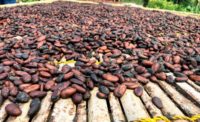The VOICE Network, a group of non-governmental organizations and trade unions advocating for cocoa sustainability, has released the 2020 Cocoa Barometer report.
In its biennial review of the cocoa sector, the group found cocoa farming communities are still battling the effects of poverty, child labor and deforestation.
“The 2020 Cocoa Barometer report provides stark details of how little positive impact current and past interventions are having for the farmers at the beginning of the supply chain,” said Antonie C. Fountain, Cocoa Barometer co-author. “Twenty years into rhetoric, the challenges on the ground remain as large as ever. Poverty is still the daily reality for virtually all West African cocoa farmer families, child labor remains rife and old growth forests continue to be cleared to make way for cocoa production.”
The VOICE Network says a window of opportunity is open to move towards justice, as momentum for change is gathering across different stakeholders. Campaigning by CSOs over the last two years has resulted in an increasing number of chocolate companies asking for regulation, while global actors like the EU are committed to putting legislation in place. Cote d’Ivoire and Ghana, the world’s two largest producers of cocoa, have organized to drive up the price for cocoa farmers.
The report notes the last two decades of interventions have not succeeded for three reasons.
• Regulatory efforts have only been voluntary, not mandatory. Within the multitude of government-driven covenants, national multi-stakeholder platforms and sector-wide collaborations, there are no penalties for non-compliance nor enforcement to meet targets. However, those at the bottom – cocoa farmers often living below the poverty line – do lose their sustainable cocoa certification if they do not comply. While there has been an increase in regulatory processes and commitments to due diligence, they are limited without accountability, transparency and equitable enforcement.
• The underlying problems that exacerbate extreme poverty – including low cocoa prices, lack of infrastructure, and no transparency and accountability as you move higher in the supply chain – remain unsolved. There needs to be recognition that in its current form, the business model for high yields of cocoa means poverty for farmers and profit for chocolate manufacturers.
• Efforts to solve complex issues of injustice and unsustainability in the cocoa sector have not given farmers and CSO a seat at the table. Instead of inviting farmers and civic society to take a respected seat at the decision-making table, problems have been assessed using a top-down industry-based approach.
The VOICE Network makes three key recommendations:
• Regulation that regulates companies, rather than penalizing the farmers. Recognizing that bad farming is not the problem, but rather a symptom of an unfair system, the report advocates for systems change and regulation that creates an enabling environment. Current forms of certification and farm-based standards increase pressure on farmers. The Voice Network recommends laws that hold the powerful accountable. Compliance criteria are imbalanced and need restructuring so that companies are held accountable to due diligence systems.
• Effective partnerships between producer and consumer countries. If the answer is creating an enabling environment, partnership agreements are needed between producer and consumer countries that facilitate and finance this. Processes that set partnerships in motion should be inclusive and deliberative, ensuring that civil society and farmer groups have a respected voice at decision-making tables.
• Deliver on a fair price for farmers. The single biggest positive impact for farmers and incentive for farming sustainably is delivering a fair price for the cocoa they produce. Cocoa and chocolate companies must find ways to redistribute value along the supply chain so that farmers are guaranteed a living income.
The full 2020 Cocoa Barometer report can be read at cocoabarometer.org.






